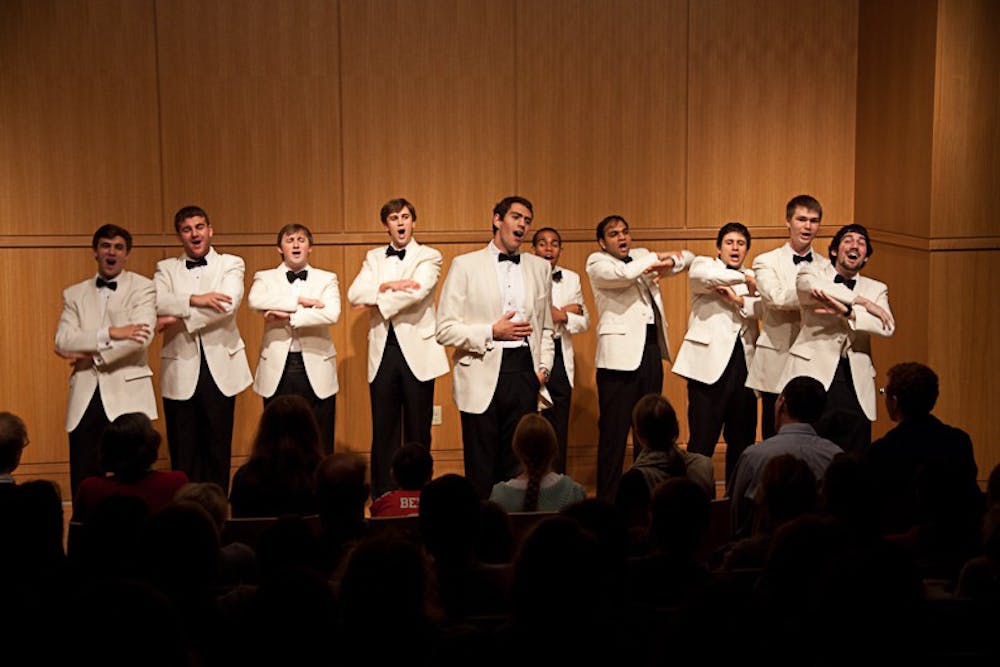Even when gently crooned by an animated crab, the song “Kiss The Girl,” from the Disney hit “The Little Mermaid,” is more misogynistic and dismissive of consent than cute. By performing the song multiple times each semester, the Tigertones elevate it to an offensive and violating ritual.
No matter how “great the tradition,” this canonical Tigertones tune should be struck from their repertoire. Its lyrics raise some serious issues. The premise of the song, originally sung in the Disney film The Little Mermaid, is that the male Prince Eric, on a date with the beautiful female Ariel, should kiss her without asking for a single word to affirm her consent. Despite the fact that an evil sea-witch cursed Ariel’s voice away, making verbal consent impossible, the song is clearly problematic from the get-go.
Removed from its cushioning context of mermaids, magic, and PG ratings, the message comes across as even more jarring. Lyrics such as, “It’s possible she wants you too/There’s one way to ask her/It don’t take a word, not a single word/Go on and kiss the girl, kiss the girl,” and “she won’t say a word/Until you kiss that girl,” unambiguously encourage men to make physical advances on women without obtaining their clear consent.
The song launches a heteronormative attack on women’s right to oppose the romantic and sexual liberties taken by men, further inundating the listener with themes of toxic masculinity. In trying to motivate Eric to kiss Ariel, the crab, Sebastian, makes use of lines such as, “Looks like the boy’s too shy,” “Don't be scared,” and “It’s such a shame, too bad/You’re gonna miss the girl.”
Such expressions imply that not using aggressive physical action to secure Ariel’s sexual submission makes Eric weak — an irrefutable scaredy-cat. Applied outside of the realm of the movie, these statements suggest that masculinity is contingent on domination of women. This attitude can catalyze violent tendencies toward, and assault against, women.
Yet the lyrics alone do not motivate my ardent desire for the Tigertones to stop performing the song.The a capella group must stop singing the song because, whenever they render it, the Tigertones call one male and one female audience member up to join them. They then proceed to sing and dance with the “volunteers,” who are often pressured to join the singers by their friends’ cheers and the unrelenting appeals of a Tone, and attempt to goad the oft-reluctant pair into kissing.
The hypothetical issues brought up by the song’s lyrics come to fruition as unacceptable conduct in the Tigertones’ performances. The singers reinforce the heteronormativity reflected in the words of the song by selecting one male and one female audience participant. The fervor with which the all-male Tones press the man to kiss the female subject eerily amplifies the song’s assertions of toxic masculinity. The absence of opportunity for the chosen woman to protest at a Tigertones show mimics the song’s acceptance of the woman’s lack of consent to being kissed.
I have seen a queer student brought on stage have to uncomfortably push away her forced male companion. I have heard of unwilling girls being subjected to their first kisses. I have watched mothers, who have come to see their child’s performance, be pulled up to the stage only to have tension generated between them and the kid they came to support.
There is no way to guarantee that the random people picked from the audience are members of a happy couple who both want to act out a very public expression of affection. Too many people have felt uncomfortable and violated by this practice to continue its justification on the basis of popularity or tradition. The fact that it has continued as long as it has is disturbing.
The Tigertones may not be asking the girl if she wants to be kissed, but I am asking them to stop singing this song — now.
Noa Wollstein is a sophomore from Plainview, N.Y. She can be reached at noaw@princeton.edu.









